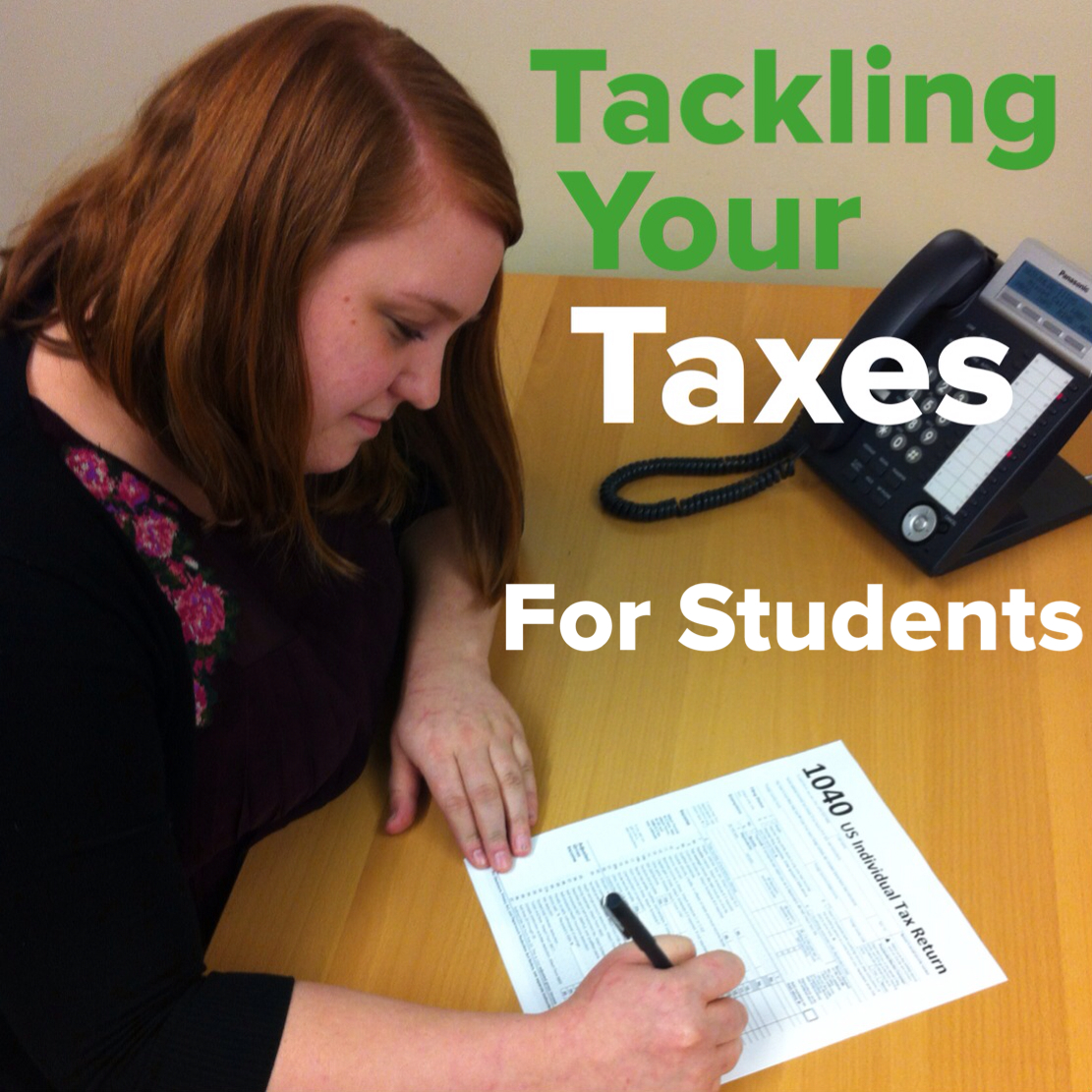
Tackling Your Taxes: For Students

Filing taxes can be a time-consuming and confusing process. Our guide can help students save time and get clarity about how to navigate their taxes.
- How do I know if I should file or not?
- What is the deadline for filing?
- What documents do I need in order to file?
- What forms do I need to file?
- Where do I file?
- Can I get free help filing?
- Am I considered a dependent?
- Should I take a Standard Deduction or itemize?
- What can I deduct?
- What is the difference between a deduction and a credit?
- What tax credits might I be eligible for?
- How do I file Oregon taxes?
- Should I get an “instant” tax refund?
- Can I get free help resolving an audit by the IRS?
How do I know if I should file or not?
Some of the conditions under which you must file are:
- If you are not a dependent and earned more than $10,000
- If you are a dependent and earned more than $6,100.
- If you are self-employed (even if you are a dependent) and earned $400 or more.
- If you earned $108.28 or more from a religious organization (such as a church, synagogue, etc.) or an organization controlled by a religious organization.
If you earned income from a job this year you should consider filing because you could get a refund even if you did not earn enough to be required to file.
What is the deadline for filing?
April 15.
What documents do I need in order to file?
- A social security number
- W-2 form: This is a record of the pay you received from your employer and the taxes your employer withheld over the year. Your employer is required to provide your W2 by the end of January, for the previous year.
- Any documents you have showing income from self-employment, such as copies of checks or bank statements.
- If you are going to use a service in preparing your taxes, you will often need a photo ID
If you paid interest on student loans last year:
- 1098-E form: If you have paid interest on your student loans of more than $600 over the last year, you should have received this form from your lending institution by the first week of February of a given year.
What forms should I file?
The most likely situation for students is that you must file one form for federal taxes and one form for each state in which you earned income. Most people will file a version of the 1040 form for their federal taxes. To know what forms you should file for Oregon taxes visit the “How do I file Oregon Taxes” section below. There are different kinds of 1040 forms that you may file depending on your circumstances. For example, many students may be able to file a 1040EZ because they do not have children and are not married. These are some of the most commonly used kinds of 1040 forms for federal taxes:
- 1040 Form: for anyone
- If you earn less than $100,000 you can file a shorter form called a, 1040A.
- If you are not married and have no dependents, you can file an even shorter form, the 1040EZ.
If you were self-employed last year (mowing lawns, tutoring, babysitting, etc.):
- 1040 Schedule C (Schedule C-EZ) form: If you were self-employed, you will need to file a 1040, Schedule C form. If your self-employment did not involve more than $5,000 in expenses, you made a profit and you do not have employees, you may be eligible to file a simpler form called a Schedule C-EZ.[1]
- 1040 Schedule SE: If your self-employment made you $400 or more of profits, you will need to file a Schedule SE form to pay your taxes for Social Security and Medicare. When you are employed by someone else, your employer pays these taxes and withholds them from your paychecks.
Where do I file my taxes?
If you earned less than $58,000 for the year, you can file your federal taxes through free downloadable software from the Internal Revenue Service, called Free File.
In order to use Free File, you will need:
- Your Social Security Number
- W-2 forms from all your employers
- A valid email address
- Records of any unemployment compensation you received in the last year
You can file your Oregon state taxes online through the services listed by the Oregon Department of Revenue.
Note about tax preparation services and websites:
If you have a simple filing for your federal and state income taxes, consider using Free File or the forms and instructions made available by the Oregon Department of Revenue (and see below “How do I file Oregon taxes”). Tax preparation websites can add significant fees to the basic service of completing your tax filing under the promise of a “free” federal filing. If you choose to pay a company, such as H&R Block, Jackson Hewitt or TurboTax, to help you in preparing your taxes, make sure to follow the Internal Revenue Service’s tips:
- Avoid return preparers who claim they can obtain larger refunds than other preparers.
- Avoid preparers who base their fee on a percentage of the amount of the refund.
- Use a reputable tax professional that signs and enters a preparer tax identification number (PTIN) on your tax return and provides you with a copy for your records.
- Avoid preparation services that suggest they will not be available for contacting after you file, accessing your records can be essential to maintaining good standing with your taxes if the IRS ever has a question about one of your returns.
- Never sign a blank tax form.
- Ask questions. Do you know anyone who has used the tax professional? Were they satisfied with the service they received?
Also, avoid services such as “Refund Anticipation Checks” or “Refund Anticipation Loans,” these products are ways that companies preparing your taxes can take a sizable portion of your refund through very high interest charges without substantially speeding your refund.[2]
If you believe you have been the victim of an abusive tax preparer, you can report the abuse to the IRS on Form 14157, Complaint: Tax Return Preparer. If you believe a company or individual filed or altered a return without your consent, you should also file Form 14157-A, Return Preparer Fraud or Misconduct Affidavit. Download the forms on the IRS.gov website or order them by mail at 800-TAX-FORM (800-829-3676). Then mail copies of any materials from the abusive company to:
Internal Revenue Service Lead Development Center
Stop MS5040
24000 Avila Road
Laguna Niguel, California 92677-3405
Probably yes. If you earned less than about $58,000 last year, you can use the programs available through the IRS’s Free File to help you complete your federal income tax return. If you earn $52,000 or less and live in the Portland metropolitan area, you may be able to get assistance with preparing your federal and state taxes through the Volunteer Income Tax Assistance (VITA) Program. You can find help through a VITA location by using the Internal Revenue Service’s Vita Locator Tool.
Am I considered a dependent?
Ask your parents or guardians if they are claiming you as a dependent. If you are a full-time student, some of the most common reasons you may be considered a dependent are if:
- You are under 24 and
- You did not provide more than half of your own financial support in 2013 and
- You are not married and
- You lived with your parents for more than half of 2013.
Should I take a Standard Deduction or Itemize?
It is likely that most students should file for what is called a “standard deduction” on your 1040. This means that you will not list the individual items that you are deducting from your taxable income. The alternative to the standard deduction is an “itemized deduction” in which you must list and document the deductions you claim.
For example, the Standard Deduction for 2013 is $7,600. To know if you might want to itemize add up the amount you pay in:
- State and local taxes,
- Interest on a mortgage
- Gifts to charities
- Medical expenses above about 10 percent of your income (for example, if you earn $30,000, the only deductible medical expenses would be the amount you incur after paying about $3,000)
A standard deduction probably makes the most sense for most students unless the total of the list above clearly exceeds $7,600.[3]
Your tuition and school fees may be deductible depending on your income. You may use this deduction on top of a Standard Deduction. You do not need to itemize your deductions to use the tuition and school fees deduction. You may qualify if:
- You have an income of less than $65,000 or $130,000 if you file jointly, you may deduct up to $4,000
- You have an income between $65,000 and $80,000 or $130,000 and $160,000 if you file jointly, you may deduct up to $2,000
- If you make more than $80,000 ($160,000 jointly) you cannot deduct for school expenses.
- Your employer can provide education assistance benefits of up to $5,250 to go toward tuition, fees, or other school supplies. If you pay these expenses, you may be eligible to deduct them under the category of “employee business expense.”
You can claim a tuition and fee deduction through Form 8917.
Even if you do not have itemized deductions on your 1040, Up to $2,500 of your student loan interest may be deductible if:
- You are not a dependent
- You have an income of less than about $75,000 or $150,000 if you file jointly
What is the difference between a deduction and a credit?
A deduction lowers the amount of your overall income that is taxable. A tax credit lowers the amount you pay in taxes by the amount of the credit. For example, if you must pay 20% tax on your income, a $1,000 deduction would lower your tax bill by $200. If you had a $1,000 tax credit would lower your tax bill by $1,000.
What tax credits might I be eligible for?
Common tax credits for which students may qualify include:
- The Earned Income Tax Credit: If you are single, have no children and earned less than $14,340, you may be eligible for the Earned Income Tax Credit (EITC). Students with a higher income who are married and/or have children may also qualify for the EITC. The EITC can represent hundreds or even thousands of dollars difference in how much you pay in taxes. To learn if you qualify for the EITC visit the webpage for the IRS’s EITC Assistant tool.
Unless you are married and file separately or you have already taken a tuition and fees deduction, you may take educational tax credits such as:
- The Lifetime Learning Tax Credit: for each year you are enrolled you can take up to $2,000 as a credit if your income is under about $50,000 ($100,000 for joint-filing). You may also qualify for some credit if your income is between $50,000 and $60,000 ($100.000 to $120,000 for joint-filing).
- The American Opportunity Credit: While you are enrolled at least half-time as a student as an undergraduate, you can take up to $2,500 as a credit if your income is less than about $80,000 ($160,000 for joint filing). If you have an income between $80,000 and $90,000, you may still be able to claim some credit. If this credit exceeds the amount you owe in taxes, you may be able to get up to 40% of this credit amount as a refund.
To see what other tax credits you may be eligible for, visit the IRS’s website.
How do I file Oregon taxes?
If you must file a federal income tax return, you must also file an Oregon income tax return if you earned any income in Oregon. This is a separate process from the federal tax return but the deadline is the same: April 15th. Find the online filing system for Oregon taxes at the Oregon Department of Revenue.
Oregon Residency
How you file Oregon taxes depends upon whether you are a full-year resident, part-year resident or nonresident of Oregon. Students can determine what their residence status is by following the Oregon Department of Revenue’s guidance.
Oregon Tax Credits
- Earned Income Tax Credit for your Oregon income taxes: If you qualify for the federal Earned Income Tax Credit (see above), you also qualify for an Earned Income Tax Credit on your Oregon state income taxes. This is true even if you are a part-time resident or a nonresident, in which case your credit is proportional to the percentage of your income that was earned in Oregon.
- Working Family Child Care credit: As outlined by the Department of Revenue, You may qualify for the Working Family Child Care credit if ALL of the following apply:
-You are an Oregon resident with at least $8,400 of income or are a nonresident with at least $8,400 of income from employment in Oregon
-You have less than $3,301 in investment income
-Your child lived with you for more than 6 months, was under 13 years old, or had certain disabilities
-The person providing your child with child care was not that child’s parent, guardian, relative or step relative under the age of 19
-Your income level does not exeed the maximum allowed under the credit for your family size. To learn if your income level allows you to qualify for the Working Family Child Care credit this year, consult the Department of Revenue’s table for your family size.
Oregon Tax Deductions
If you received scholarship money that you used for housing expenses, you may be able to subtract the amount of that scholarship that went to housing expenses from your Oregon income. However, you may only do this if you have included the scholarship as part of your taxable federal income. For more information, consult the Department of Revenue.
Should I get an “instant” tax refund?
No. If you see an offer for an “instant” tax refund, this is actually a loan marketed as a way to get your refund faster. These loans can have very high interest rates that will cause you to lose money from what you may get back in a refund while not speeding the process very much. If you file with the Internal Revenue Service online, you can often get your refund within 10 days.[4]
Can I get free help resolving an audit by the IRS?
If your tax filings are examined for closer individual inspection by the Internal Revenue Service, a process known as an audit, you may be able to get assistance clarifying what you owe. If your income is below 250% of the poverty line, you may get assistance in resolving problems with the IRS by consulting a Low Income Taxpayer Clinic (LITC).
In Oregon LITCs can be found through:
- Catholic Charities El Programa Hispano: 503-489-6845
- Legal Aid Services of Oregon (with services in Spanish, Mandarin and Japanese): 888-610-8764 and 503-224-4086
- Lewis & Clark Low Income Taxpayer Clinic: 503-768-6500
[1] https://turbotax.intuit.com/tax-tools/tax-tips/Self-Employment-Taxes/-Wh…
[2] http://www.nclc.org/images/pdf/high_cost_small_loans/ral/ral-report-2013…
[3] https://turbotax.intuit.com/tax-tools/tax-tips/Tax-Deductions-and-Credit…
[4] http://abcnews.go.com/Blotter/beware-instant-tax-refunds-tax-time-tips/s…
Topics
Find Out More


Trouble in Toyland 2023

VR risks for kids and teens

